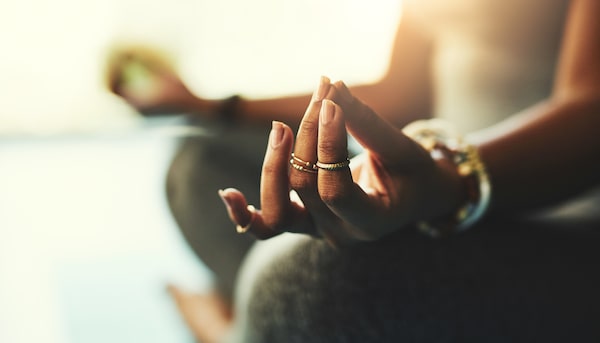
It’s not too late to move self-care away from contemporary consumerist movements back to its radical origins.PeopleImages/iStockPhoto / Getty Images
A few years ago, my approach to self-care was simple: keep busy. Too busy, since I hoped that a non-stop schedule would carry me far enough to escape a chorus of self-doubt. And so self-care became another part of my work/life imbalance. Yes, I was exhausted, sick and anxious, but if I could make time for a face mask or to pick up a fresh, new notebook, I was still doing it all.
Except that I wasn’t. Once the pandemic forced me to spend time alone without deadlines or dinner plans, I realized a new planner or abundance candle were no longer the answer. In fact, they never were.
Seeking refuge in what we can buy is a far cry from activist and poet Audre Lorde’s description of self-care as not self-indulgence but as “self-preservation,” which is “an act of political warfare.” Lorde herself faced an unimaginable battle when she wrote about self-care in her 1988 essay collection A Burst of Light, while she was fighting cancer and continuing to inspire Black resistance.
Today, we’re seeing self-care as a catch-all for capitalist-centric me-time, spurred on by brands that I’m sure have their hearts in the right place, but don’t seem to understand that not only can quick fixes not be bought, they don’t exist at all. “I think capitalism has deeply betrayed the mental health of most people in our society,” says Dr. Pooja Lakshmin, MD, psychiatrist and author of Real Self-Care, drawing a connection between the lack of available health care and the rise of easy-to-access, commodified “wellness.”
This makes sense: The global wellness economy ballooned to US$4.4-trillion in 2020, and is expected to reach upward of US$7-trillion by 2025. And none of us are immune to it. Even with all my newfound contemplation about the real meaning of self-care, in the past few months I became a person with a ritualistic skincare routine who keeps a jade roller in her freezer. (I’ve used it once.)
“My definition of self-care is in your decision-making,” Lakshmin continues. Translation: Self-care has everything to do with making small daily choices that amount to a better, healthier outcome over time.
Dr. Gabor Maté, physician and trauma expert, echoes these sentiments: “Inside the commodified, profit-motivated ideology of capitalism, self-care becomes yet another product – or more accurately, an infinite array of products to be purveyed and purchased,” he says. “People become consumers rather than beings with awareness, agency and the deep connection to the self that true self-care requires.”
“One thing that bothers me about the self-care movement is that it’s very individualistic,” shares Stephanie Jones, mental-health educator, speaker and author. “We’re forgetting a big part of self-care is our connection to other people.” She adds: “I think we need to stop and really think about what we value, what we do with our time and who we are.”
I do love a face mask and a scented candle, but such material objects are part of a bigger picture in which I’m still learning how to navigate grief and exhaustion. I only began feeling like I could put myself back together when I admitted to my family and friends that I didn’t know how. Through talk therapy, I learned how to listen to what my body was telling me, and unpack the waves of anxiety that I’d try and stifle with magical thinking and impulse buys. More importantly, I accepted that as people, we’ll always be works-in-progress.
“It’s scary, but real change doesn’t happen overnight,” Lakshmin affirms. “There’s an illusion – especially when you’re burnt out – that there’s going to be one right choice that’s going to fix everything. Instead, each small decision is like a little breadcrumb that gets you to the next one, and I find that to be hopeful because there’s not so much pressure.”
Maté is also a proponent of treating self-care as a process as opposed to a single act. “We begin the journey to authentic self-care by noticing, without self-judgment, what does not work to promote a sense of well-being,” he explains. “When we catch ourselves habitually behaving in those ways, we don’t judge ourselves: We recognize, with compassion, how we took on that programming and we ask, gently, whether it still serves us. And then we seek help, or resolve on our own, to keep noticing such patterns and to let go of them as best we can.”
However, it remains frustrating when you want to feel better right away or when you want the people you love to feel at peace. “I can’t give you a solution, I can give you a map,” says Lakshmin. “There are four principles: setting boundaries, dealing with guilt, developing compassion and understanding your values. And for each individual person, the first step is going to look different.”
Especially if you identify as a woman: Women experience anxiety twice as often as men, while 60 per cent of women aged 18-34 surveyed by Angus Reid and CBC said their mental health had worsened two years into the pandemic. “Nobody can change your life for you. Especially for women, real self-care is an understanding of how you take up space and negotiating how to ask for what you need and what you want while also being in relationships with people that you care about,” adds Lakshmin.
Which is to say, despite what slick product branding would have us believe, taking care of our physical selves often stops short. “Perhaps the biggest misconception we have is that self-care means only or mostly attending to the body by means of diet, exercise, or this-or-that product,” Maté concludes. “Important as physical self-care is, true self-care encompasses knowing and honouring our emotional needs – the most human aspect of who we are.”
So maybe it’s not too late to return self-care to its radical origins. No juice cleanse, bone broth or anti-aging pillow required.